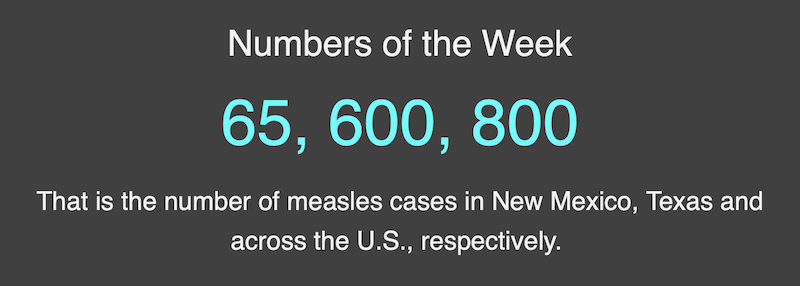|
Courtesy of New Mexico In Depth The Midweek by Trip Jennings Two new cases of measles were diagnosed in southern New Mexico this week, pushing New Mexico’s total caseload to 65, according to the Associated Press. Lea County is the hardest hit in the state’s outbreak, with Chaves and Doña Ana counties reporting one case each, the news service reported. From a geographical standpoint, it makes sense Lea County is the epicenter of New Mexico’s outbreak. It is on the Texas border and abuts Gaines County, the epicenter in Texas, the state with the most cases, 600, or nearly three-quarters of the 800 cases diagnosed across the nation. Seminole, a town in Gaines County, is only 30 minutes from Hobbs, New Mexico. I imagine a lot of folks from both counties mingle day-in, day-out as they shop or otherwise hang out, giving measles, an airborne disease that is spread when an infected person coughs, sneezes or talks, an opportunity to spread. While measles is not always fatal, three people this year have succumbed to measles-related illnesses — two elementary school-aged children in Texas and an adult in New Mexico, all of whom were unvaccinated. Despite those deaths and active outbreaks of the illness in seven other states beyond Texas and New Mexico, a new poll from KFF, an independent source of health policy research, finds that half of American adults are unsure if certain false claims about measles are true or false. The three claims are: • the measles, mumps rubella vaccines have been proven to cause autism • vitamin A can prevent measles infections. • getting the measles vaccine is more dangerous than becoming infected with measles. None of these claims are true. But there’s a lot of misinformation and disinformation floating around these days. Robert Kennedy, Jr., the U.S. Secretary for Health and Human Services, isn’t helping matters, with his long standing skepticism of vaccines. Before joining the Trump administration, he said the MMR vaccine that protects against measles is dangerous. Kennedy did say that the vaccine was the most effective way to prevent measles earlier this month, but that was met with anger from vaccine critics who saw it as a betrayal of Kennedy’s long standing views on vaccine safety, CNN reported. And he continued to sow confusion, saying the vaccine had not been sufficiently tested and only provided short-lived protection. Both claims are false. The KFF survey found that partisanship plays a major role in whether people know measles cases are spreading and whether they are worried about the most recent outbreak, the KFF survey found. Here are a couple of findings: Democrats are much more likely than Republicans to say they are worried about the outbreak of measles in the U.S. (76% v. 28%), and to know measles cases are up this year compared to recent years (71% v. 49%).Similar partisan gaps exist among parents as well, with Democratic and Democratic-leaning parents more than twice as likely as Republican and Republican-leaning parents to express worry over the outbreak of measles (73% v. 26%) and more likely to know the number of cases is currently higher than in past years (64% v. 37%). Even amid widespread exposure to false claims about measles, large majorities of the public (83%) and parents (78%) say they are “very” or “somewhat confident” that the MMR vaccines are safe. However, confidence in the safety of MMR vaccines is lower among Republican and Republican-leaning parents, with about three in ten (31%) expressing a lack of confidence in the safety of MMR vaccines, including about one in six (17%) who say they are “not at all confident” the MMR vaccine is safe. I’ve kept up with the measles outbreak this year but it felt close to me when I spent several days in Lubbock late last month due to a death in the family.
I wasn’t worried about contracting measles myself. My parents made sure my brother and I were vaccinated when we were children, as did my wife’s parents when she was little. Both of our children received the MMR vaccine before they entered public school and they’re in their 20s now. I probably would have worried about traveling to Lubbock if our children were newborns or toddlers. If any one of us were to get sick, I told myself, we were protected by the decades-old vaccinations. It was that all the national news stories mentioned the outbreak happening near Lubbock, probably because it’s the largest city in that part of West Texas and most people don’t know where Gaines County is. My stay in Texas pushed to the front of my mind the question of how so many Americans have become distrustful of public health measures meant to help protect children — and people in general. It’s not a surprise or a shock after living through the COVID pandemic when many concerns were raised about the safety of that vaccine, or that there’s a partisan divide around the measles vaccine. COVID made clear we’re living in a different world than we lived in a few decades ago. Distrust of experts — scientists, academics, physicians — and institutions is palpable these days. It’s enough to make one wonder how we’ll get past the disparate worlds we inhabit as Americans.
0 Comments
Your comment will be posted after it is approved.
Leave a Reply. |
Submit your ideas for local feature articles
Profiles Gardening Recipes Observations Birding Essays Hiking AuthorsYou! Archives
October 2025
Categories
All
|


 RSS Feed
RSS Feed